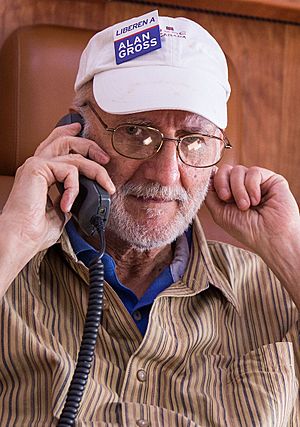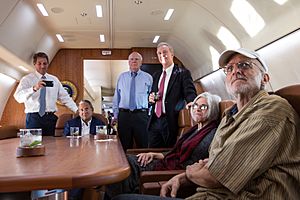Alan Gross facts for kids
Quick facts for kids
Alan Gross
|
|
|---|---|

Alan Gross talking on the phone with President Barack Obama, 2014
|
|
| Born |
Alan Phillip Gross
May 2, 1949 |
| Occupation | United States government contractor employed by U.S. Agency for International Development |
| Criminal status | Released |
| Spouse(s) | Judith Gross |
| Criminal penalty | 5 years in prison for importing banned technology with the intent of establishing clandestine Internet service |
| Imprisoned at | Carlos J. Finlay Military Hospital, Havana |
Alan Phillip Gross (born May 2, 1949) is an American who used to work for the United States government. He was employed by an organization called the United States Agency for International Development (USAID).
In December 2009, Alan Gross was arrested in Cuba. He was working on a program that aimed to help people in Cuba connect to the internet. In 2011, he was found guilty of bringing special communication equipment into Cuba without permission. Cuban officials said he was working against their government. Many people in the U.S. disagreed that he was a spy. Alan Gross was released from prison on December 17, 2014. He returned to the U.S. as part of an exchange for three Cubans who had been held in the U.S.
While Alan Gross was in prison, his wife, Judy Gross, took legal action against the company he worked for, Development Alternatives Incorporated (DAI), and USAID. The company later settled the case. Alan Gross has since moved to Israel.
Contents
About Alan Gross
Alan Gross was born in Rockville Centre, New York. He grew up there and in Baltimore. He studied sociology and social work in college. Later, he moved to Potomac, Maryland.
He had a long career helping with international development. He worked in about 50 countries across the Middle East, Africa, and Europe. This included places like Iraq and Afghanistan. In these places, he helped set up satellite communication systems for groups that help people, known as NGOs.
In 2001, he started his own company called JBDC LLC. This company helped provide "Internet connectivity in places where there [is] little or no access." Alan Gross and his wife, Judy, lived in Potomac, Maryland, near Washington, D.C.. They have two daughters named Shira and Nina.
Why Alan Gross Was Arrested
His Work in Cuba
Alan Gross was working for a company called Development Alternatives Inc. (DAI). This company had a contract with USAID to help people in Cuba get communication equipment. The goal was to help Cubans get around the government's control over information. Alan Gross received money for his work. He spoke very little Spanish and had not worked in Cuba before this project.
USAID's program in Cuba was meant to promote democracy. However, some reports in the U.S. Congress criticized it. They said it was wasteful and put people in danger.
American officials said that Alan Gross visited Cuba four times in five months in 2009. He traveled on a tourist visa. He delivered computers and satellite equipment to three Jewish community groups. In December 2009, he was on another trip to see how the groups were using the equipment.
Cuba's small Jewish community has religious freedom and good relations with the government. This made some people wonder why the U.S. was giving them equipment through a program usually meant for people who disagree with the government.
In 2012, Cuban authorities claimed that Alan Gross had visited Cuba earlier, in 2004. They said he delivered a video camera to a leading Freemason who was actually a Cuban intelligence agent.
Risks and Equipment
Alan Gross wrote reports about his trips to Cuba in 2009. These reports showed that he knew about the risks he was taking. He did not tell people he was working for the U.S. government. Instead, he said he was part of a Jewish humanitarian group.
To avoid being caught by Cuban authorities, he asked American Jews to help. He told them to pack electronic items one by one in their carry-on luggage. He also traveled with American Jewish humanitarian groups. This way, he could talk to Cuban authorities if they asked questions.
Alan Gross said that customs officials at Jose Marti International Airport checked him thoroughly. He declared all the items he had. The equipment he brought on his fourth trip included iPods, BlackBerry Curve smartphones, MacBooks, external drives, satellite modems (called BGANs), routers, and other networking tools. Most of this equipment was legal in Cuba. He wrote in his report that wireless networks were set up in three communities, with about 325 users.
He went to Cuba a fifth time in late November 2009. He was arrested 11 days later. When he was arrested, he had a special high-tech chip. This chip was designed to hide satellite phone signals. This type of chip is usually given to U.S. intelligence agencies and the military.
His Arrest and Time in Jail
Alan Gross was arrested on December 3, 2009, at the El Presidente Hotel. He was first held at Carlos J. Finlay Military Hospital, then at Villa Marista prison. This is a detention center.
He spent 25 days in jail before a U.S. diplomat visited him. However, a Cuban lawyer visited him earlier. He was allowed to call his wife four days after his arrest. During the visit from the U.S. diplomat, Alan Gross said Cuban officials were treating him "with respect." He also said his questioning had been "very intense at first." His cell had a TV and a fan, and he shared it with two other men.
His lawyer, Armanda Nuria Piñero Sierra, also represented the families of five Cubans held in U.S. prisons. This led to ideas that Cuba wanted to trade Alan Gross for these five Cubans. In 2011, the U.S. State Department offered to let one of the Cubans serve his probation in Cuba if Alan Gross was released.
Many Jewish groups protested his detention. They asked for his release.
Charges and Sentencing
In January 2010, a Cuban official claimed that Alan Gross was "contracted to work for American intelligence services." Both the U.S. government and Alan Gross's lawyers denied this.
In February 2011, Alan Gross was charged with "acts against the independence and territorial integrity of the state." This crime could lead to up to 20 years in prison. His trial was set for March 4, 2011.
On March 12, 2011, Alan Gross was sentenced to 15 years in prison. Cuban officials said he was part of a "subversive project of the U.S. government." This project aimed to disrupt their country using communication systems. Alan Gross's wife and U.S. lawyer attended the trial. Three U.S. officials also watched the trial.
Alan Gross's case was appealed to the Supreme Court of Cuba. The court upheld the sentence in August 2011.
Reactions and Efforts to Help

After the sentence, Alan Gross's American lawyer, Peter J. Kahn, said the family was "devastated." He said Alan and his family had paid a huge price in the ongoing disagreement between Cuba and the United States. Kahn promised to keep working for Alan's release. He also asked for Alan Gross to be released right away for humanitarian reasons.
U.S. officials, including U.S. National Security Council spokesman Tommy Vietor and Secretary of State Hillary Clinton, called for Alan Gross's immediate release. They said he had been "unjustly jailed."
Several members of the U.S. Congress visited Cuba to see Alan Gross. Jewish community groups also asked Pope Benedict XVI to speak to Cuban leaders about releasing Alan Gross during his visit to Cuba in March 2012.
Alan Gross's wife, Judy, publicly criticized President Barack Obama and U.S. policy toward Cuba. She said her husband was a "pawn" in a "failed policy." She also said the trial was not really about him, but about U.S. policy. Alan Gross reportedly wanted the Obama administration to talk with Cuba to solve issues between the two countries, including his case.
Life in Prison
In April 2014, Alan Gross went on a hunger strike for nine days.
In August 2014, his wife reported that Alan Gross refused to see her or their daughter when they visited him in Cuba. He also refused to see visitors from the U.S. Interests Section in Havana. His wife and daughter wrote that Alan Gross told them not to visit him again.
Alan Gross was held at the Carlos J. Finlay Military Hospital with two other inmates who spoke Spanish. Alan Gross reportedly knew some Spanish.
In December 2014, it was reported that Alan Gross refused treatment from Cuban doctors. He had threatened to go on hunger strikes if he was not released without conditions.
To pass the time, Alan Gross became very interested in digital art. He used a computer he was given to create over 2,000 pieces of art using Microsoft PowerPoint and Paint. Some of his favorite pieces included "Finlay 1" and "Villa Marista."
His Health in Prison
When Alan Gross was arrested, he weighed about 254 pounds. He lost a lot of weight during his time in prison. He also refused medical and dental care.
His wife and attorney said his health had gotten worse. They said he had arthritis and had trouble walking. In May 2012, a lump appeared on his right shoulder. Cuban doctors said it was a hematoma (a collection of blood). Alan Gross's family hired a U.S. doctor who thought the lump might be something more serious, like cancer. They argued he should be released because of this.
However, the president of the Hebrew Community of Cuba, Adela Dworin, visited Alan Gross several times. She said he "looked very agile" and was not very worried about the lump. In November 2012, a New York Rabbi who is also a doctor examined Alan Gross. He said that Alan Gross did not have any cancerous growth.
The Cuban Foreign Affairs Ministry also confirmed that the lump was not cancerous. They said Alan Gross's health was normal for a man his age and that he was being properly treated.
In December 2014, Alan Gross released a statement. He complained that his teeth had fallen out and that he had lost weight. At the same time, he said he was refusing all medical and dental care because he wanted to be released immediately.
Release from Prison
In November 2014, The New York Times suggested that the United States and Cuba should exchange prisoners. On December 17, 2014, the Cuban government released Alan Gross. They said it was for humanitarian reasons. He was allowed to fly back to the United States on a U.S. government plane.
Some members of the Cuban Five were also released on the same day. However, the governments said these two releases were not connected. This exchange was part of a larger period of improved relations between the United States and Cuba.
See also
 In Spanish: Alan Gross para niños
In Spanish: Alan Gross para niños
 | Leon Lynch |
 | Milton P. Webster |
 | Ferdinand Smith |

